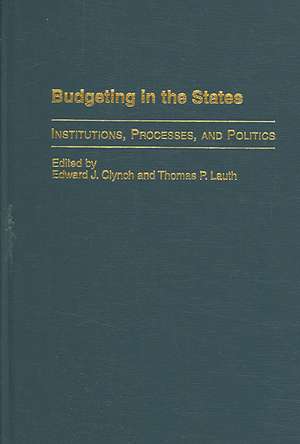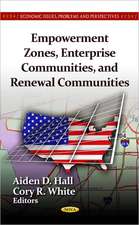Budgeting in the States: Institutions, Processes, and Politics
Editat de Edward J. Clynch, Thomas Lauthen Limba Engleză Hardback – 29 sep 2006 – vârsta până la 17 ani
Preț: 439.34 lei
Preț vechi: 605.10 lei
-27% Nou
Puncte Express: 659
Preț estimativ în valută:
84.06€ • 87.78$ • 69.42£
84.06€ • 87.78$ • 69.42£
Carte tipărită la comandă
Livrare economică 15-29 aprilie
Preluare comenzi: 021 569.72.76
Specificații
ISBN-13: 9780275980139
ISBN-10: 0275980138
Pagini: 332
Dimensiuni: 156 x 235 x 28 mm
Greutate: 0.6 kg
Editura: Bloomsbury Publishing
Colecția Praeger
Locul publicării:New York, United States
ISBN-10: 0275980138
Pagini: 332
Dimensiuni: 156 x 235 x 28 mm
Greutate: 0.6 kg
Editura: Bloomsbury Publishing
Colecția Praeger
Locul publicării:New York, United States
Notă biografică
Edward J. Clynch is Professor and Graduate Coordinator for the Department of Political Science and Public Administration at Mississippi State University. His research interests include public administration education and state budgeting. He has published numerous articles on these topics in professional journals. He is the co-editor of Governors, Legislatures, and Budgets: Diversity Across the American States.Thomas P. Lauth is Dean of the School of Public and International Affairs at The University of Georgia. His articles on state budgeting have appeared in several academic journals. He is the co-author of Compromised Compliance: Implementation of the 1965 Voting Rights Act, co-author of The Politics of State and City Administration, and co-editor of Governors, Legislatures, and Budgets: Diversity Across the American States.
Cuprins
AcknowledgementsBudgeting in the States: Institutions, Processes, and Policies--Edward J. Clynch and Thomas P. LauthCalifornia: Revenue Scarcity, Incremental Solutions, the Rise of Citizen Initiatives and the Decline of Trust."--Jerry L. McCaffreyGeorgia: Shared Power and Fiscal Conservatism--Thomas P. LauthNew York: The Growth, Waning, and Resurgence of Executive Power--Dall W. Forsythe and Donald J. BoydConnecticut: Public Scarcity and Private Wealth--Carol W. LewisIllinois: Constitutional Versus Negotiated Powers--Douglas R. Snow and Irene S. RubinOregon: The Influence of Direct Democracy on Budget Outcomes--Bill SimonsenFlorida: Ebb and Flow in Executive-Legislative Relations--Robert B. BradleyKentucky: The Executive/Legislative Budget Role Transition Continues--Merl M. Hackbart and James R. RamseyNevada: Budgeting at The CrossroadsPaula D. YearySouth Carolina: Executive Budgeting Brings A Stronger Gubernatorial Voice to the Table--Cole Blease Graham, Jr.Virginia: Expenditure Increases, Tax Cuts, and Budget Deficits--James K. ConantWisconsin: Institutions, Processes, and Policies--James K. ConantMississippi: Changing Gubernatorial-Legislative Dynamics in Budget Decision Making.--Edward J. ClynchTexas: The Use of Performance Data in Budgeting and Management--Robert L. Bland and Wes ClarkeUtah: "Economics, Political Culture, and Priority Setting"--James J. GoslingBudgeting in the States: Innovations and Implications--Edward J. Clynch, Thomas P. Lauth, Barbara A. Patrick
Recenzii
State budget processes in the US, although following approximately the same general template, have many individual features, and they work in differing political contexts. The essays that Clynch and Lauth have assembled for this volume track these differences and what they have meant for individual state finances in the last two decades..These authors give outstanding insights into how budget procedures operate; how institutions and demographics in states influence the process and outcomes; how political balancing shapes state finances; how process reforms arrive and then fade in government operations; and how states manage shocks to their economic systems. They demonstrate again how states can operate as insulated chambers of experimentation in the American federal system and how many different ways a responsible and responsive fiscal system can be constructed. Highly recommended. Graduate, research, and professional collections.
Sixteen papers characterize formal executive-legislative relationships across states and examine several informal factors that help governors and legislators overcome institutional weaknesses and increase their leverage over budget decisions. Papers discuss budgeting in the statess--institutions, processes, and policies.
A good way to take the pulse of a state's priorities and its political, demographic, and economic trends is to look at its budget. Clynch and Lauth introduce 16 chapters examining the contentious process involved in budget and policy-making. Building on the framework they presented in Governors, Legislatures and Budgets: Diversity Across the American States (1991), they overcome deficits in both aggregated data and single-state studies by presenting in-depth, single-state studies developed within a common framework and timeframe. To the mix of gubernatorial and legislative authority, they add the complicating factors of political party controls, court decisions, voter initiatives, and rational budget reforms instituted by most states.
Sixteen papers characterize formal executive-legislative relationships across states and examine several informal factors that help governors and legislators overcome institutional weaknesses and increase their leverage over budget decisions. Papers discuss budgeting in the statess--institutions, processes, and policies.
A good way to take the pulse of a state's priorities and its political, demographic, and economic trends is to look at its budget. Clynch and Lauth introduce 16 chapters examining the contentious process involved in budget and policy-making. Building on the framework they presented in Governors, Legislatures and Budgets: Diversity Across the American States (1991), they overcome deficits in both aggregated data and single-state studies by presenting in-depth, single-state studies developed within a common framework and timeframe. To the mix of gubernatorial and legislative authority, they add the complicating factors of political party controls, court decisions, voter initiatives, and rational budget reforms instituted by most states.
















